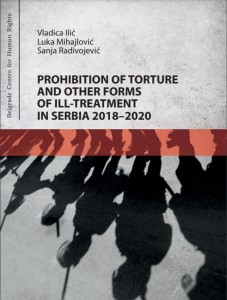 The Belgrade Centre for Human Rights has published its publication Prohibition of Torture and Other Forms of Ill-Treatment in Serbia 2018-2020, which includes an analysis of the relevant national criminal law, prosecutorial investigations and court proceedings against public officials suspected of extortion of confessions and torture or ill-treatment. The publication analyses investigations of police ill-treatment during the July 2020 civic protests and presents the results of a survey of public awareness of post-arrest rights.
The Belgrade Centre for Human Rights has published its publication Prohibition of Torture and Other Forms of Ill-Treatment in Serbia 2018-2020, which includes an analysis of the relevant national criminal law, prosecutorial investigations and court proceedings against public officials suspected of extortion of confessions and torture or ill-treatment. The publication analyses investigations of police ill-treatment during the July 2020 civic protests and presents the results of a survey of public awareness of post-arrest rights.
The research shows that the national criminal law framework on the prohibition of torture and other forms of ill-treatment is unsatisfactory and that the numerous shortcomings of the Criminal Code, the Criminal Procedure Code, the Legal Aid Act and other regulations are precluding effective investigations of ill-treatment cases and the adequate punishment of public officials found guilty of those crimes.
Police officers still account for most public officials charged with these crimes. The data indicate that their collegiality goes beyond professional; as a rule, they neither report their fellow officers who torture or ill-treat people nor testify against them (at least 226 officers testified in such cases but none of them confirmed that the defendants had used excessive force against the victims). Investigations against public officials are neither prompt nor comprehensive and are rarely independent. Nearly all public officials found guilty have been handed down suspended sentences. In the analysed period, only two police officers found guilty of torturing an individual in Niš were convicted by a final judgment to five and eight months’ imprisonment, and only five officers found guilty in one case (of ill-treatment during the 2014 Pride Parade in Belgrade) lost their jobs. In all other analysed cases, the convicted officers did not suffer any work-related consequences, except for one officer whose salary was cut by 20%. In all cases ending with a final decision, the courts instructed the victims of ill-treatment to claim damages in civil proceedings.
Not one of the scores of proceedings initiated in response to police brutality during last year’s protests have been completed. The prosecution offices and the Interior Ministry’s Internal Control Sector claim that they cannot establish the identity of the uniformed officers not wearing visible ID who ill-treated people on Belgrade and Novi Sad streets in July 2020.
The survey showed that members of the public are insufficiently aware of their rights in case they are deprived of liberty.
The research was conducted with a project funded by the European Centre for Not-for-Profit Law.
The analysis is available in Serbian and English.







